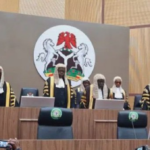
Experts have proffered varied predictions over the outcome of the next Monetary Policy Committee (MPC) of the Central Bank of Nigeria (CBN) meeting.
The MPC will be holding its last meeting for the year on November 20 and 21, 2017.
The committee will review amongst others, the current state of the global economy as well as changes in key macroeconomic indicators in the local economy in order to determine policy directions for key monetary variables in the near term.
The experts at Meristem Securities, in a report released last week, said “We note that the committee is likely to focus on consolidating on the gains attained so far as a result of policy decisions implemented in the year. Consequently, we expect the MPC to make the following decisions: Retain the MPR at its current level of 14.00%, retain liquidity ratio at 30%, retain the asymmetric corridor at +200bps/-500bps and retain the CRR at 22.5%.”
They further anticipate, that the committee will consider the impacts of capital spending in the proposed 2018 Appropriation Bill; the recent political upheavals in Saudi Arabia and its impact on the price of crude oil; and the impact of the recent downgrade of the country’s sovereign rating by Moody’s on fiscal policy in 2018.
However, for researchers at FSDH, the short-term outlook of the Nigerian economy favours a monetary policy easing. They believe that the MPC may either reduce the Monetary Policy Rate (MPR) by a few basis points or adjust the rates around the asymmetric corridor of the rate.
They argue that the current tight monetary policy stance was justified in order to maintain stability in the foreign exchange market and curb high inflation rate.
At the international scene, the Organisation of Petroleum Exporting Countries (OPEC) reviewed upwards its global growth forecast to 3.6% for 2017 in its monthly report for October 2017, from 3.5% in its September 2017 monthly report.
Growth for 2018 was also reviewed to 3.5% from 3.4% for the same period.
The Federal Open Market Committee (FOMC) of the United States Federal Reserve maintained the Federal Funds Rate at its November 2017 meeting.
“The prospect of economic activities in Nigeria is improving,” FSDH research expects said and expected the Gross Domestic Product (GDP) to grow by 1.24% in 2017 and 3.46% in 2018.




